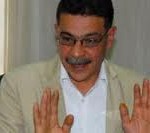As President Mohamed Morsy met with over 40 political and legal experts to reach national accord over the constitutional crisis columnists explored his invitation for dialogue.
Emad Al-Din Hussein
Al-Shorouk Newspsper
Morsy’s speech and the blood curse
Hussein analyses Morsy’s first speech following the violence near the Presidential Palace. He rejects speculation that the president would have retracted his constitutional declaration or would have postponed the constitutional referendum in his first official speech.
To Hussein, Morsy succeeded in winning invaluable time by carefully utilising the debates around the constitutional declaration, coupled with the public preoccupation with street violence near the Presidential Palace, as a smokescreen hiding the true intentions of his Muslim Brotherhood to safeguard its Constituent Assembly and Shura Council, and to finalise the constitutional referendum.
Hussein suggests that the Muslim Brotherhood are attempting to impose a new internationally-approved status quo with their planned passing of the constitution.
Hussein regrets that Morsy failed to condemn the Muslim Brotherhood demonstrators who assaulted anti-Morsy protestors outside the Presidential Palace. What makes Hussein’s suspicions even more clear is Morsy’s praising of those rallies supporting his constitutional declaration.
He concludes that the presidential establishment has no independence from the Brotherhood’s guidance bureau. He sees that while the spilt blood of those who were killed in the clashes was skilfully used by the Brotherhood to achieve their narrow-minded and short-lived objectives, the blood curse will be always attributed to the masterminds of these events.
Gamal Fahmy
Tahrir Newspaper
The night of the Nazis

Fahmy recounts the kristallnacht incidents of 9-10 November 1938, when Adolf Hitler succeeded in stirring the national pride of German citizens. Using the assassination of the German ambassador to France by a Jewish man as a pretext, he incited Germans to launch a vicious campaign of violence against Jews and foreigners across Germany and Austria. The name kristallnacht comes from the amount of broken glass in Jewish shops and establishments.
This incident was the beginning of the darkest chapter in the history of modern European imperialism Fhamy writes, which resulted in death, injury, displacement, and mass destruction on a scale never before witnessed in recorded human history. These events were also exploited by the same victims of European fascism however, the Jews, who used their suffering as a justification to expel Palestinians from their homes and land to establish the state of Israel.
Relating these events to the current attacks by what he calls Muslim Brotherhood militias on peaceful demonstrators near the Presidential Palace, Fahmy argues that Egypt will not bow to its own form of fascism, but the price will be high.

